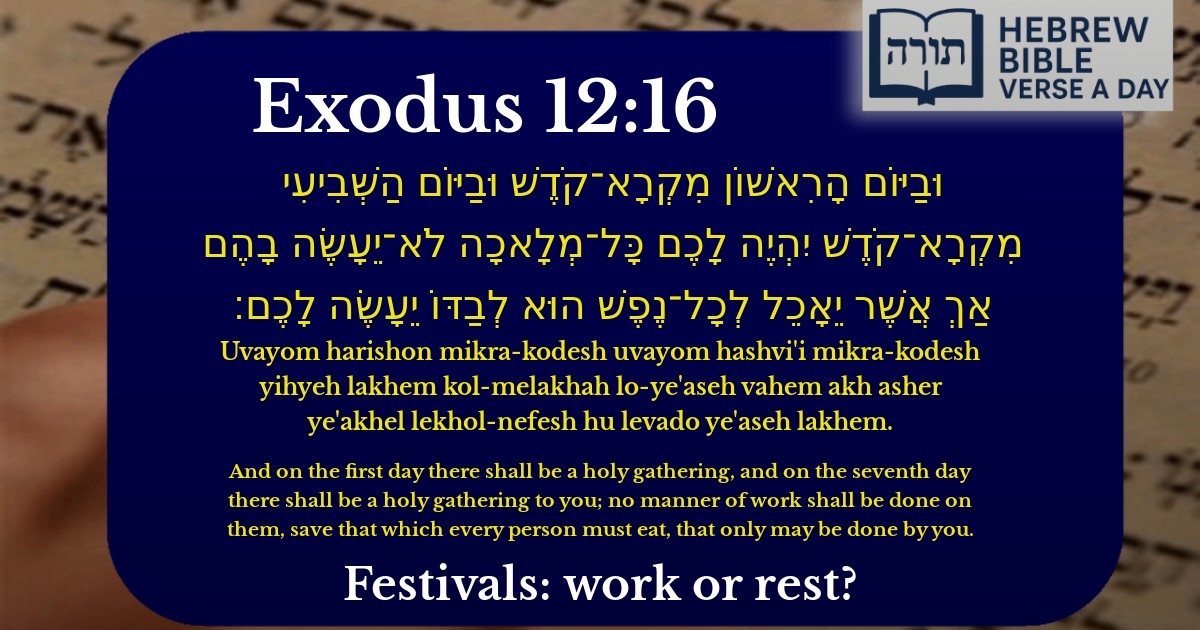Join Our Newsletter To Be Informed When New Videos Are Posted
Join the thousands of fellow Studends who rely on our videos to learn how to read the bible in Hebrew for free!
Hebrew Text
וּבַיּוֹם הָרִאשׁוֹן מִקְרָא־קֹדֶשׁ וּבַיּוֹם הַשְּׁבִיעִי מִקְרָא־קֹדֶשׁ יִהְיֶה לָכֶם כָּל־מְלָאכָה לֹא־יֵעָשֶׂה בָהֶם אַךְ אֲשֶׁר יֵאָכֵל לְכָל־נֶפֶשׁ הוּא לְבַדּוֹ יֵעָשֶׂה לָכֶם׃
English Translation
And on the first day there shall be a holy gathering, and on the seventh day there shall be a holy gathering to you; no manner of work shall be done on them, save that which every person must eat, that only may be done by you.
Transliteration
Uvayom harishon mikra-kodesh uvayom hashvi'i mikra-kodesh yihyeh lakhem kol-melakhah lo-ye'aseh vahem akh asher ye'akhel lekhol-nefesh hu levado ye'aseh lakhem.
Hebrew Leining Text
וּבַיּ֤וֹם הָרִאשׁוֹן֙ מִקְרָא־קֹ֔דֶשׁ וּבַיּוֹם֙ הַשְּׁבִיעִ֔י מִקְרָא־קֹ֖דֶשׁ יִהְיֶ֣ה לָכֶ֑ם כׇּל־מְלָאכָה֙ לֹא־יֵעָשֶׂ֣ה בָהֶ֔ם אַ֚ךְ אֲשֶׁ֣ר יֵאָכֵ֣ל לְכׇל־נֶ֔פֶשׁ ה֥וּא לְבַדּ֖וֹ יֵעָשֶׂ֥ה לָכֶֽם׃
וּבַיּ֤וֹם הָרִאשׁוֹן֙ מִקְרָא־קֹ֔דֶשׁ וּבַיּוֹם֙ הַשְּׁבִיעִ֔י מִקְרָא־קֹ֖דֶשׁ יִהְיֶ֣ה לָכֶ֑ם כׇּל־מְלָאכָה֙ לֹא־יֵעָשֶׂ֣ה בָהֶ֔ם אַ֚ךְ אֲשֶׁ֣ר יֵאָכֵ֣ל לְכׇל־נֶ֔פֶשׁ ה֥וּא לְבַדּ֖וֹ יֵעָשֶׂ֥ה לָכֶֽם׃
🎵 Listen to leining
Parasha Commentary
📚 Talmud Citations
This verse is quoted in the Talmud.
📖 Pesachim 68b
The verse is referenced in a discussion about the prohibition of work on the first and seventh days of Passover, emphasizing that only food preparation is permitted.
📖 Megillah 20b
The verse is cited in the context of discussing the sanctity of the first and seventh days of festivals, particularly regarding the prohibition of work.


Context in the Torah
This verse (Shemot 12:16) appears in the context of the laws of Pesach, specifically regarding the first and seventh days of the festival. The Torah establishes these days as mikra'ei kodesh (holy gatherings), during which melacha (work) is prohibited, with the exception of food preparation.
Meaning of "Mikra Kodesh"
Rashi explains that mikra kodesh refers to a sacred assembly, a time when the Jewish people gather for prayer and Torah study. The Rambam (Hilchot Yom Tov 6:17-20) elaborates that these days are designated for spiritual elevation, resembling Shabbat in their sanctity, though with key differences in permitted activities.
Prohibition of Melacha (Work)
The verse prohibits all melacha except for ochel nefesh (food preparation). The Talmud (Pesachim 50a) derives from this that the prohibition of work on Yom Tov is less stringent than on Shabbat, permitting activities needed for food. The Mechilta emphasizes that this exception applies only to food for human consumption, not for animals.
The Dual Sanctity of the First and Seventh Days
Halachic Applications
The Shulchan Aruch (Orach Chaim 495:1) rules that only food preparation directly related to the Yom Tov meals is permitted. The Mishna Berurah adds that unnecessary labor, even if food-related, remains prohibited. This reflects the balance between physical needs and spiritual sanctity on Yom Tov.
Spiritual Significance
The Sefat Emet teaches that these days are "holy gatherings" because they unite the physical and spiritual dimensions of Jewish life. Permitting food preparation acknowledges the Torah's recognition of human needs, while the prohibition of other work ensures focus on divine service and communal unity.